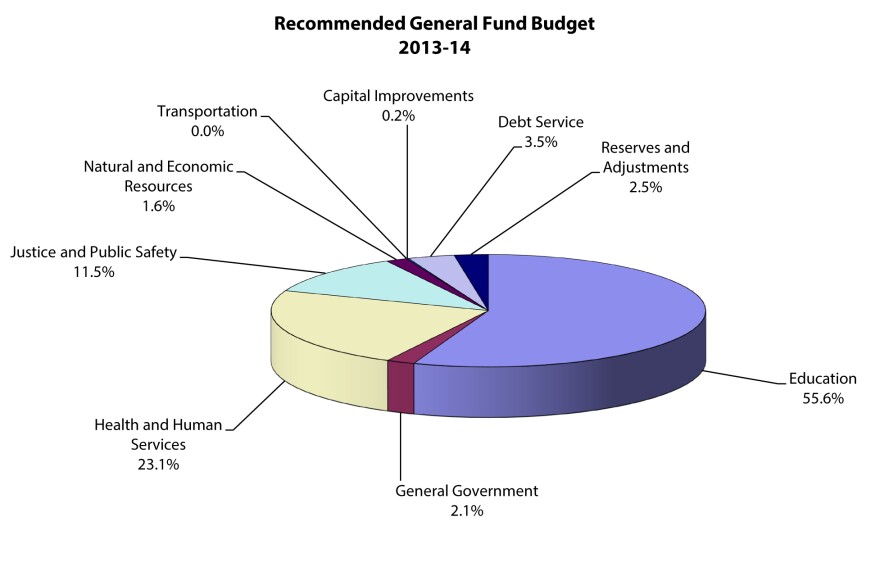Government employees across the state are working on budgets this month. Officials in rural towns, big cities and the Capitol are finalizing spending plans for the fiscal year beginning July 1st. But the process, speed and public involvement required to craft a fiscal blueprint can vary significantly.
A couple of weeks ago, House lawmakers held a marathon floor session where they debated their budget proposal for more than eight hours. Toward the end of the debate, senior Republican budget writer Nelson Dollar rose from his seat to make a final pitch.
"This budget provides for the needs of our people in education, in the classroom our teachers, our courts, our infrastructure...George is giving me the cut sign."
Dollar's speech was cut short by the Speaker of the House. General Assembly rules require two different budget votes - on different days.
"Those in favor will vote 'aye', those opposed will vote 'no.' The clerk will open the vote," Speaker Tim Moore instructed the 120 legislators.
A vote was cast at 11:50-something: a few minutes before Friday morning. Then, after a short recess and some further deliberation, lawmakers voted again. They passed a budget before heading home for the weekend. Earlier this week, the budget process played out in Wake County, albeit somewhat less hastily.
"Next up we have Irv Portman, Cary, NC. Come on down Irv, good to see you," greeted Commissioner Chairman James West.
There was a distinctly different fiscal tempo as seven County Commissioners took notes and made eye contact with the dozen or so citizens.
"So it was a good feeling today that it appeared that they were truly listening and wanting to hear what the public has to say," explained longtime Zebulon resident Tom Benton. He is the vice-chair of the Wake County Board of Education and he likes the spending draft. Public budget hearings are mandated at the local level because of a 1971 law enacted by the General Assembly. There is no such requirement at the state level.
"The budget process at the state level is frustrating. And it has been frustrating for many, many years. And not just under Republicans but under Democrats also," Benton says. "A lot of it seems to be done in secrecy. A lot of it seems to be done behind closed doors and then you're hit with a thousand page document and given 12 hours to react to it."
What are some of the differences state versus local?
"Well besides night and day? The local process is much simpler," said Gerry Cohen. Once upon a time Cohen served on the Chapel Hill Town Council. Then, for 37 years, he worked at the legislature - on the budget.
"In the local government, generally it's a unitary thing. There are a lot less actors; there are city and county managers and a much smaller number of council members, or county commissioners. Whereas with 170 actors the process is by its nature much more complicated."
Local budgets are like a canoe and the state spending measure looks more like a catamaran. Wake County's budget is just north of $1 billion dollars. Commissioners there have a month to read, engage the public, tweak, consider, and vote on the plan. State representatives proposed a $22 billion budget and voted on it in a matter of hours.
"I would like to have had at least a week, get the budget on a Monday and maybe vote on it the next Monday. That may sound short, but when you've only got a day, that sounds long," said Gale Adcock, a Democratic House Representative. The freshman lawmaker previously served on the Cary Town Council. She has worked on local and state budget plans.
"The public input on this budget was really after the fact. I got some email from people - keep this, don't keep that; I like this, I don't like that, but very little opportunity to the public to have input on the budget because the timeline was so compressed," she added.
Although public input may not be mandated at the state level, there is plenty of it. Lobbyists, special interest groups, deep-pocketed donors as well as individuals call, email or write. Representative Dollar, the budget writer, contends the process is better now than when Democrats ran the show. He says there is more time for consideration in committees.
"So we have worked on a number of reforms in that regard to have greater transparency in the process. And I think there are ways that probably can be discussed to improve it for the future," Dollar said.
Looking ahead, Wake County Commissioners will approve a budget by June 15th, barring a major surprise. The state spending plan is supposed to be in place by June 30th. State senators are expected to approve their version of the budget next week. Then the House and Senate will have to work out a compromise before sending it on to the Governor.







